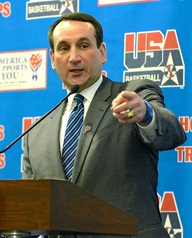
Davis talked with four members of Coach K’s second recruiting class from the early 1980s: Mark Alarie, Jay Bilas, Johnny Dawkins, and Dave Henderson. What struck me were the examples characterizing great leadership in the comments of these four former Duke University basketball players. Here’s my take on characteristics of great leaders in the comments of these former Duke players:
- Great leaders have a passion: Alarie said Coach K would talk with such passion that the Coach had “goose bumps on his arms.”
- Great leaders are honest: Coach K did not break the NCAA rule about when coaches could talk with a recruit, but other coaches did according to Bilas.
- Great leaders are trustworthy: “He was immediately trustworthy.” (Bilas)
- Great leaders back their people: Henderson talked about going to a Duke game when he was being recruited. Watching how Coach K reacted to plays and vehemently fought for his players, Henderson said: “I said in my mind, I can play for that guy. I could see he would stand up for his players.”
- Great leaders have vision: Alarie said Coach K shared his vision, and did so with more passion “than any other coach who came into my living room.”
- Great leaders forgive: Dawkins talked about how Coach K taught him “to have a short memory.” Coach K did not see a missed shot as a mistake.
- Great leaders don’t forget: In their first year in the ACC tournament, these players lost to Virginia by 43 points. In their second year on the first day the team practiced, the score of that game was on the scoreboard. (Bilas)
- Great leaders keep their people informed: When there were campus rumors that Coach K might loss his job at Duke, he told the team his contract had been extended and there was “nothing to worry about.” (Bilas)
- Great leaders understand proper planning prevents poor performance: Alarie said he “never had a [NBA] coach put one-tenth of the elbow grease into constructing a single practice as Coach did for every one of those practices.” Coach K prepared detailed written plans for practices with explanations as to why.
- Great leaders shape their organizational culture: Dawkins commented, “We were a blue-collar program, and he made sure we stayed that way.”
- Great leaders are authentic: “I see him today, and he’s still the same person who coached me.” (Dawkins)
A one-page article in Sports Illustrated. Reflections from players about Coach K. So much wisdom. Thanks, Seth, for a great angle on a great person. And thanks to the players who shared their stories. Congrats, Coach.
Davis, S. (Feb 2, 2015). “Before he was Coach 1K”, Sports Illustrated, p.80.
Image of Coach K by William Moss. This image was taken by a DOD employee as part of official duties and is in the public domain. http://commons.wikimedia.org/wiki/File:Krzyzewski_at_Pentagon_cropped.JPG
____________________________________________________________
Follow me on Facebook at https://www.facebook.com/johnballardphd
On Twitter: @johnballardphd
Decoding the Workplace: 50 Keys to Understanding People in Organizations, coming in May,
http://www.abc-clio.com/Praeger/product.aspx?pc=A4781C


 RSS Feed
RSS Feed